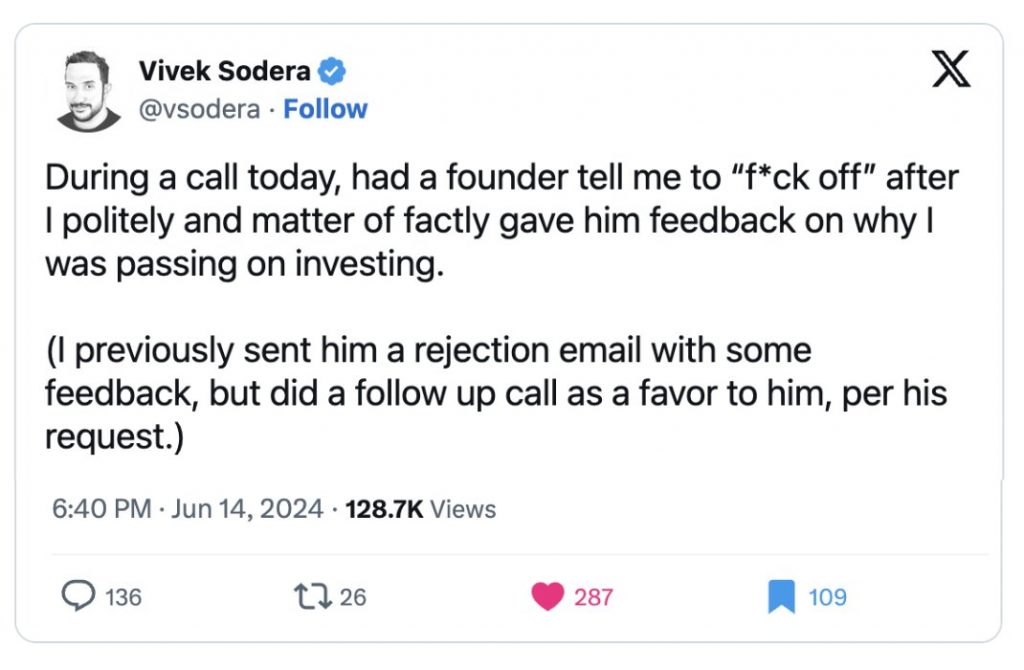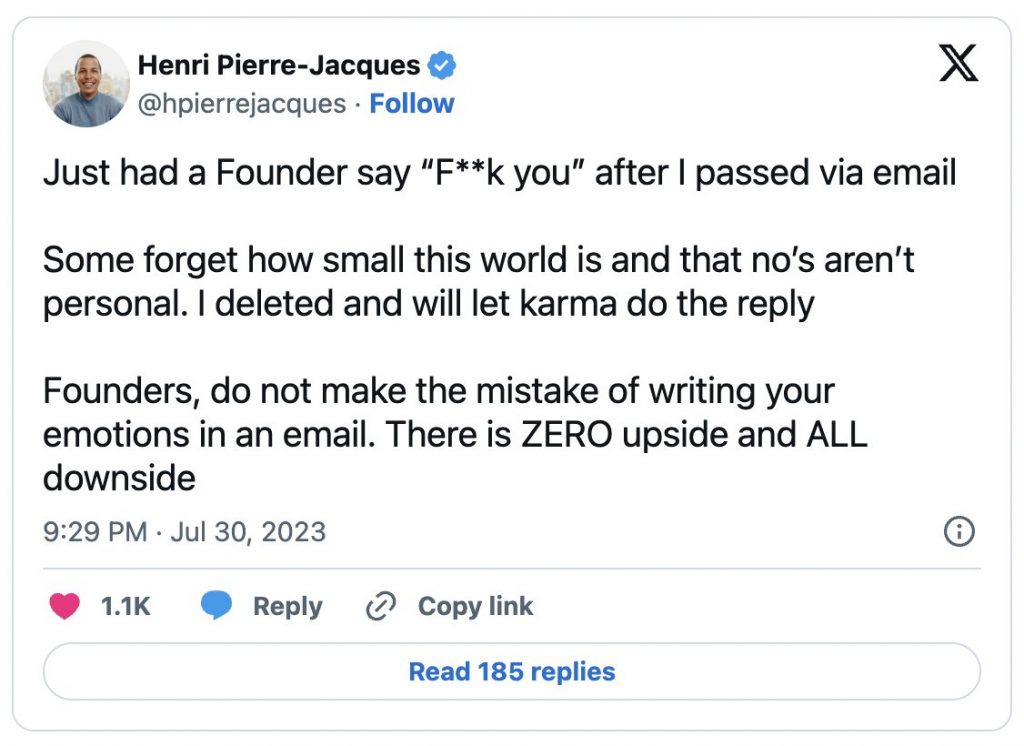
The Negative Expected Value of Delivering Negative Feedback
Feedback is how we make sense of environments, and a key input into what we classify as relevant or not [1]. So what happens when the environment doesn’t respond?
It would probably have all sorts of absolutely strange, wild, incredible effects, wouldn’t it?
For Example
If after pitching a Venture Capitalist (VC), they don’t reach out the next day, then it’s a no for right now.
It’s a pass. It doesn’t necessarily mean no forever.
It could. It might.
You don’t know.
But it’s a no for right now.
The silence is the feedback.
The absence of signal is the signal.
Why is it that way?
Many VC’s exhibit behaviour that is consistent with rational calculations. (That doesn’t mean they’re always rational — because who is?)
It’s rational to estimate negative expected value from offering negative feedback, especially when the entrepreneur’s capacity for receiving negative feedback is estimated to be negative.

Blurts, sadly, pollute the feedback pool overall for founders. And it makes the talent pool a lot poorer. If it’s suboptimal and anti-social, then why does it happen?

Reactive Reactivity
Readers of this space probably know the struggle: It may be quite difficult to separate ones identity from what they are from what they have ventured. In this section, I’m going to attempt to draw a few distinctions that are embedded within a system that emerges and is experienced.
Assume that reactivity is a quality attribute.
This quality attribute it may be a capability, a competency, a skill, and a feature embedded within a personality. And maybe we’ll define a personality as a set of unconscious or semi-conscious scripts – sets of fast-twitch, low-processing, instinctive responses: texts, thoughts, feelings, sensations, images, impulses, and ticks. It’s reasonable to assume that as a quality attribute of a personality or person, reactivity, it varies across a population of individuals and it varies within individuals depending on their state: development, sleep, day of week, accumulated stress, knowledge, anxiety, diet, pain, status-desire, hormones, community, social-milieu, frustrage, frustration, and so on.
Frustration is caused by a gap between the way it is now and the way it ought to be now. When one gets negative or null feedback, it can cause a sensation to manifest. An attempt to modify the way it is now did not meet or exceed the expectation of gap resolution in the immediate term – and isn’t that frustrating? The magnitude of the reaction may be a function, in part, by the size of the expectation gap, the amount of time that the gap has persisted, and by the reactivity attribute possessed by the individual.
It stands to reason that an individual that has high reactivity and high frustration will react more strongly to negative feedback than an individual with low reactivity and high frustration.
Subject-Object Separation
I often resort to the story of Macho Man Randy Savage to explain the difference between identity, subject, and object, and I’ll do so again. When I saw the Macho Man Randy Savage, I knew that Macho Man Randy Savage was playing a character. I suspected that people around me knew that he was playing a character. And most of us suspended disbelief so as to share an experience of a performance. I was entertained. Randy Mario Poffo played, acted, the role of Macho Man Randy Savage.
Some people choose to play the role of a founder, of an entrepreneur: dawning the t-shirt, the hoodie, the space-suit, a forced smile with the lips, a sugary temperament that threatens to inflict diabeetus on anybody within breathing distance, and whatever else one needs to imitate in order to signal whatever they estimate others need to hear in order to alleviate whatever frustration is felt, to get the banana, to achieve ones’ purpose.
Some founders do not appear to have a separation of identity between whatever it is they identify as themselves and the role they’re choosing to play. It’s as though Randy Mario Poffo would literally believe, unironically, that they were the Macho Man Randy Savage, all of the time.
The persona of Macho Man Randy Savage is one of extreme masculinity and high reactivity. High reactivity and extreme valence tend to be associated with commitment. High energy is commitment. It’s hyperbole personified. And it’s a blast to watch.
The distance between the subject, whoever Randy Mario Poffo was and the object, whatever Macho Man Randy Savage was, is both useful and, potentially, harmful.
If there is a separation between the subject and the object, would there be any reason to take anything personally? The feedback can be appropriately applied to the object, and to the subject that creates the object. The space between a person and their object, the personality they design, enables an opportunity to reflect, process feedback, and make purposeful (alternatively: meaningless) decisions.
A reactive personality created by a person without buffer would probably be prone to take negative feedback personally, and react with extreme valence towards both negative feedback and its source. A reactive personality held by a person with a buffer might not be as quick to react to negative feedback as a personal attack. The space is useful.
It could be perceived as harmful because any gap between subject and object could be seen as unauthentic, insincere, fake, phoney, deceptive, and counterfeit.
So, if there is no distinction between Randy Mario Poffo and Macho Man Randy Savage, would we say that he is CONfident and delusional? How might the Randy Mario Poffo Macho Man Randy Savage union be able to assess the relevance of feedback from the environment? Would you try?
The Rational Calculation
Delivering negative feedback can be viewed as an act of courage, as a status affirming activity, both, or neither. By offering negative feedback, one is taking a risk for which there is a negative expected value. The difference between content and spam is relevance. Negative feedback may simply be assessed as spam by the recipient. A status-conscious VC certainly doesn’t want to be perceived as a spammer.
The negative feedback, in a false-negative scenario where the VC offers negative feedback and the entrepreneur goes onto gigastardom, may produce both financial and status loss. Suppose that an entrepreneur receives negative feedback from a VC, learns from it, gets funding from a competing VC, and succeeds wildly. A Limited Partner (LP), as the VC’s boss ruler, may learn during an entrepreneurial podcast interview, in a retelling of their self-attribution success origin story, that the rejecting VC had terrible judgement for not funding them. They may go onto drag the VC’s name through the filth. They might name funds directly – in a direct reputation assault – or, worse, they may engage adversarially: deliberately advising great entrepreneurs towards some VC’s, and referring the worst entrepreneurs towards the negatively offending VC. In this mode, the conquering entrepreneur is thumping their chests, proclaiming to the world that they were committed but the dumb VC’s was not, blinded by their arrogance, and going on to enhance whichever self-attributed attributable quality attribute they feel like proclaiming at the moment. Regardless, the VC backed the wrong horse. FOMO was transformed into MO. Terrible loss of face. Dishonour.
It’s a weird yet some people really do fight for reputation. I make no claim to fully understand it. I reckon I only understand some cartoonish version of how reputation manifests itself as a virtual hedonic status good. I merely note how miserable this good appears to make some people.
From a similar zero-sum mindset: why would a VC want to risk improving an asset for another VC? If the purpose of the feedback is to help the entrepreneur learn, then why risk augmenting the performance of a competitor?
From an experience optimization mindset: who wants to pay attention to the reactive drama from a reactive entrepreneur?
Viewed in isolation from the community, it’s in the VC’s selfish self interest to conceal the content of negative feedback.
Silence itself may even be too much signal.
So What?
It would have been absurd to engage in a conversation with Randy Mario Poffo while he was playing the role of Macho Man Randy Savage about how he is performing as Macho Man Randy Savage. It would be funny to watch, wouldn’t it? Christopher Berry standing next to the Macho Man asking him if he thought Slim Jims conveyed excitement with or without the snapping? It would be funny because I would be outside of the joke, trying to understand a person who has no incentive to be understood would ever want to be understood beyond the pure entertainment value. You’d watch quite the reaction at the assumption that the Macho Man wasn’t truly a Macho Man – not literally at least.
So isn’t it just as absurd to engage an entrepreneur about playing an entrepreneur while they’re playing an entrepreneur?
It would seem reasonable that, if, as an entrepreneur, you were interested in feedback from the environment, that it would be important to signal a trait non-reactivity at the very least, or, ask for feedback at the median?
Even if one had the buffer between subject and object, of untangling identity from performance, it would still be an act of courage to even ask. It’s rarely done because everything needs to be jacked up to 11, to the moon, LFG! That’s commitment. You have to commit to the bit. To go mask-off would signal inauthenticity. Terrible loss of face. Dishonour.
Authenticity, Curiosity, Prosperity
It seems likely that since experiencing an emergent system that generates the experience of making something that you experience as yourself isn’t really yourself at all, then there isn’t really isn’t an authentic self to project. It isn’t just a question of how much of yourself is really you, how much of you are really clips from The Onion on YouTube, but if any of yourself is real. Maybe creating yourself is itself a creative act? Certainly, creating objects is an act of creation. And, if you accept the assumption that the creation of an entrepreneurial character is itself an object, then it would be a creative act. It just seems as though it’s all in response to some feedback mechanism.
Who is the person playing the part of entrepreneur?
Just as some elements of Randy Mario Poffo were projected as Macho Man Randy Savage, some elements of Elizabeth Holmes were projected as Elizabeth Holmes. How much of Elon Musk’s schtick really a reflection of what he thinks the median buyer wants to believe?
Authenticity a quality attribute might not be nearly as relevant as what it may enable, unlock, or enhance: getting feedback from the environment. It may be transformative in terms of stance.
If you’re open for feedback about two objects: the startup hypothesis and the personality you’re crafting, then you may be in a better position manage reactivity. If you’re aware that you’re making somebody up, making believe in order to make others believe, then managing reactivity you must.
Think of the forces arrayed against the entrepreneur.
The status quo exists for a reason. Powerful networks have powerful incentives to prevent an entrepreneur from disrupting the status quo. It isn’t a conspiracy. It’s worse. A conspiracy is brittle. A network of reinforcing incentives is unreasonably effective at maintaining cohesion, and as a result, difficult to dismantle. So much so that there are good reasons to believe that some problems simply can’t be decomposed by any team given our current capabilities as a species, little though any team you, yourself, might assemble. There are good reasons why those with vesting and vested interests in the status quo might estimate that it isn’t worth feeding back in the most positive way: with capital. And, there are a lot of rational people with informed judgement that aren’t going to take any risk.
As a result, the entrepreneur should expect effusive enthusiasm and silence. And a few no’s if they’re lucky. If they exhibit the courage to inquire about the nature of no, then they have the chance to hear something potentially interesting. It may be signal. It may be noise. The negativity becomes an anomaly to be curious about. Because it is interesting.
There is a faint signal in silence, but it isn’t as interesting as a no with a reason attached.
It’s a tough choice to make, because the nature of the asymmetrical information environment makes the incentives for silence and deception so short-run profitable.
Is there a way of creation that is long-run profitable?
How does one prosper in such a strange environment?
The Strange, Wild, Environment That Emerges
It’s obvious that I don’t understand most of it. And I hope only that this view sparks a few thoughts about the counter-argument, the counter the short-term reactive response to the immediate incentives. There’s has got to be a way of inventing new ways to be inventive that are more authentic, curious, shinier, and prosperous.
But it’s in this way that I’ve come to explain a small part of the strange, wild, entrepreneurial environment: a space where pageantry, delusion, capital, problems, spreadsheets, solutions, energy, convoluted cap tables, hype, hockeysticks, hoodies, stories, speculation, passion, invention, and muted fashion choices are accelerated to high speeds and smashed together.
It’s weird. It’s disorienting. It’s amazing.
Sources
[1] Jaeger, J., Riedl, A., Djedovic, A., Vervaeke, J., & Walsh, D. (2023). Naturalizing Relevance Realization: Why agency and cognition are fundamentally not computational.
